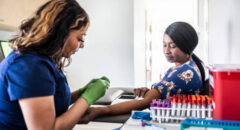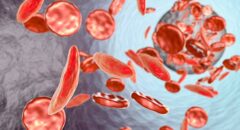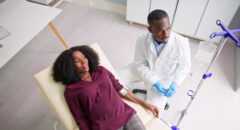BDO sits down with two sisters, one diagnosed with Sickle Cell Disease and one that is not, as they explain why they came together to create an event to make something beautiful out of an ugly disease.
BDO: Can you explain what exactly the Ruby Ball is?
Ijeoma: Yes. So the Ruby Ball is a gala, um, that is met to help bring awareness to sickle cell, bring funding to sickle cell and just help be a platform for those individuals living with sickle cell. So that they feel inspired and motivated to do their best to live their lives, to grow and not see sickle cell as a form of weakness but a form of strength from a level of excellence. And so by putting together this, um, the Ruby Ball, we seek to partner with different organizations with different sickle cell, um, was different sickle cell charities to help raise awareness and to raise funding. I feel that with within a community, I feel like sometimes we may feel disjointed when you think about like other charities or other illnesses in other communities, they have more of a connection. So when you look at like say for example with heck do they have the Susan G. Komen Walk? And so everybody recognizes that. Everybody knows what that is. So I feel that other illnesses, they have a stronger, bigger voice. So when you look at, say for example, breast cancer, they had the Susan G Komen walk with sickle cell. I feel like we don't necessarily have that. And because of that, I feel like it's kind of disjointed when it comes to sickle cell advocacy and I'm sickle cell, um, fundraising.
Kristina: The Ruby Ball celebrates people who are advocates like we're going to have an opportunity to, um, recognize Dr Efe who has done amazing things with sickle cell. So it's not just necessarily about bringing the communities together is also celebrating those people who really have a voice. So we're just trying to broaden the pool of advocacy so that people have a voice so that sickle cell has a voice.
BDO: You have your unique story learning about your, uh, yeah. Having a sickle cell trait. Yeah. Can you just expound upon that?
Kristina: Yea, I was about three years old. My sister was diagnosed with sickle cell and I remember her being in deep pain. She was in the hospital for a month and because my sister was diagnosed with sickle cell, my mom and I were also tested for sickle cell. My Dad refused to get tested. So, and he passed away in 2010 still to this day, we don't know whether he had the trait. Um, but I know that I came up negative and my mom came up negative when I was tested when I was three. And so I was talking to a doctor of mine was about 22, 23 and I was telling her about how my sister had sickle cell and I didn't have the trait and my mom didn't have the trait and the doctor said, well that's impossible. And so, so she said, well, let's test you for something that may mimic sickle cell and may have similar traits. And so I got tested for something that may mimic a sickle cell. And she called me back and she said, so you have the trait. So that was interesting to me because when I was three and I was tested, I came up negative. And then when I was in my twenties and I came up positive for the trait, that was confusing to me. And it was. It was a...
... diagnosis that I hadn't expected and had lived my life. Uh, I ran track and field. I was an athlete in college, so I had never had any experiences similar to my sisters where I had debility, pain or, or trouble with breathing or anything like that. So I never had any symptoms. So has the trait, what it means is that I'm a carrier of the disease. It means that I have to, or sometimes I feel like I have to introduce myself to guys and say, hi, my name is Christina, I have the trait. How about you? Um, and another thing that it brought to mind for me was that perhaps there are degrees, um, to the quality of testing that exists for sickle cell. So when I speak to people about having the trait I, and they say, oh, I was tested, I was negative. I said, well, when were you tested? Because I was tested when I was three and I came up negative. So have you been tested again? You should check it out. Um, so that, that's part of the advocacy I do is, is try to get people to make sure that they don't have the trait. Because as a carrier, you can go without any type of symptoms, but then you could get together and have a child with someone and then they could end up with sickle cell and growing up and seeing what my sister experienced with sickle cell. I never want to bring a child into this world knowingly that could have sickle cell disease.








